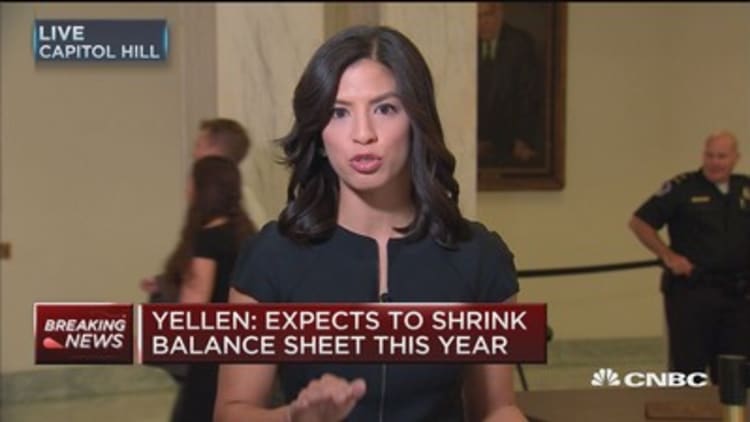
Federal Reserve Chair Janet Yellen emphasized Wednesday that the central bank is closely watching tepid inflation data but that she still expects to begin shrinking its $4.5 trillion bond portfolio later this year.
In prepared remarks for her semiannual testimony Wednesday and Thursday on Capitol Hill, she said that the bond portfolio, or balance sheet, eventually will be "appreciably below" its current level. Last month, central bank officials unveiled their plan for slowly reducing reserves by phasing out reinvestments.
Still, Yellen said she anticipates the balance sheet will remain larger than it was before the 2008 financial crisis. Several officials have said the Fed likely will maintain a portfolio that will exceed $2 trillion.
The Fed accumulated its balance sheet as it sought to stimulate the economy during and after the financial crisis. The expansion came largely through the purchase of Treasurys and mortgage-backed securities.
Though Yellen reiterated that the benchmark federal funds rate remains the primary monetary policy tool, she also said that officials would be open to growing the balance sheet again in another economic downturn.
"The committee would be prepared to use its full range of tools, including altering the size and composition of its balance sheet, if future economic conditions were to warrant a more accommodative monetary policy than can be achieved solely by reducing the federal funds rate," she said.
Officials have indicated that the Fed will allow a capped amount of bond proceeds to roll off each month and will continue to reinvest the remainder.
Yellen gave no clear indication of whether the Fed would raise interest rates a third time this year. One key factor is the direction of inflation.
Central bank officials are hotly debating the causes and likely duration of the recent downdraft in prices, with Fed Gov. Lael Brainard arguing recently that could be a reason to delay future hikes.
In her prepared testimony, Yellen blamed the weak inflation readings on "a few unusual reductions in certain categories of prices." She said she expected those would dissipate over the next year. However, she pointed out that the central bank is "carefully monitoring" the data. The Fed previously has cited cellular phone competition and lower prescription drug prices as transitory reasons for the inflation drop.
Beyond inflation, however, Yellen's assessment of the economy remained relatively unchanged: Growth is continuing at a moderate pace, labor markets are improving and consumer spending and business investment have picked up. But she also highlighted fiscal policy and economic challenges abroad as potential pockets of uncertainty.
"At present, I see roughly equal odds that the U.S. economy's performance will be somewhat stronger or somewhat less strong than we currently project," she said.
This is a breaking news story. Check back here for updates.

